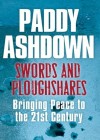Swords and Ploughshares — Bringing Peace to the 21st Century
Written by: Paddy Ashdown,
Weidenfield and Nicholson, London, 2007,
ISBN: 9780297853039, 338 pp.
Reviewed by: Colonel Marcus Fielding
As a former British Royal Marine, diplomat and politician Paddy Ashdown has a broad range of experiences to call upon in his latest role, that of international statesman. It is his period as the European Unions Special Representative in Bosnia-Herzegovina, from 2002 to 2006, that he draws upon to write Swords and Ploughshares while also reflecting upon other contemporary international interventions.
Ashdown employs a temporal framework of ‘prevention, conflict and post-conflict reconstruction as the vehicle for consideration of contemporary interventions. He further uses ‘stabilisation and ‘state building’ as two separate but concurrent phases within post-conflict reconstruction—a reflection of the complexity of these activities. He advocates that the international community can gain the best returns by investing in the prevention phase by assisting failing states to avoid descending into anarchy and civil war. Ashdown believes that contemporary conflicts within states and between ethnicities are precursors to larger inter-state conflict and must be arrested. He also believes that the international community has an obligation to intervene in ‘rogue’ states.
Writing about the situation at the international level, Ashdown wrestles with the complexities of existing national and international institutions and the existing processes used to manage global conflicts. Despite several specific recommendations for the UN, NATO and the EU, he doesn’t offer much in the way of substantial practical measures to forge a multilateral way ahead. Given the recent debate over his appointment as UN Special Representative in Afghanistan, the potential answer certainly seems to include appointing a strong personality and granting them considerable powers to coordinate and direct across the multitude of stakeholders.
Ashdown laments the lack of effort to capture lessons from contemporary interventions and to ‘codify’ those lessons, or as we would say in the military to produce some form of doctrine to help guide future interventions. This book certainly provides a good basis from which some national or international ‘doctrine’ could be developed.
I have no doubt that General Petraeus has also read or is reading this book; although he would be annoyed to find himself being wrongly called the Chief of Staff of the US Army—a disappointing but thankfully isolated editorial error. One can only hope that the politicians involved in reconstructing Iraq and Afghanistan are equally drawn to the advice contained in this book, as it is the political level—rather than the military—that Ashdown believes interventions are ultimately won or lost. While the military continues to ‘hold the ring’, as Ashdown describes it, he fears that in Iraq and Afghanistan ‘we are now in grave danger of snatching a peacemaking defeat from the jaws of military victory’
Towards the end of the book, Ashdown also offers some sage observations on how the ‘war on terror’ is being waged. ‘Our problem is that we have chosen the wrong mindset, the wrong battlefield, the wrong weapons and the wrong strategies to win this campaign. It is somewhat tangential to the main topic of this book, but thankfully he also offers a few pages of thoughts on what the right approaches might be.
Swords and Ploughshares is short, insightful and useful. For members of the ADF and other Australian government agencies who have served in Timor Leste, Afghanistan or Iraq this book provides a good perspective on the context and challenges of international interventions and state-building ventures.

